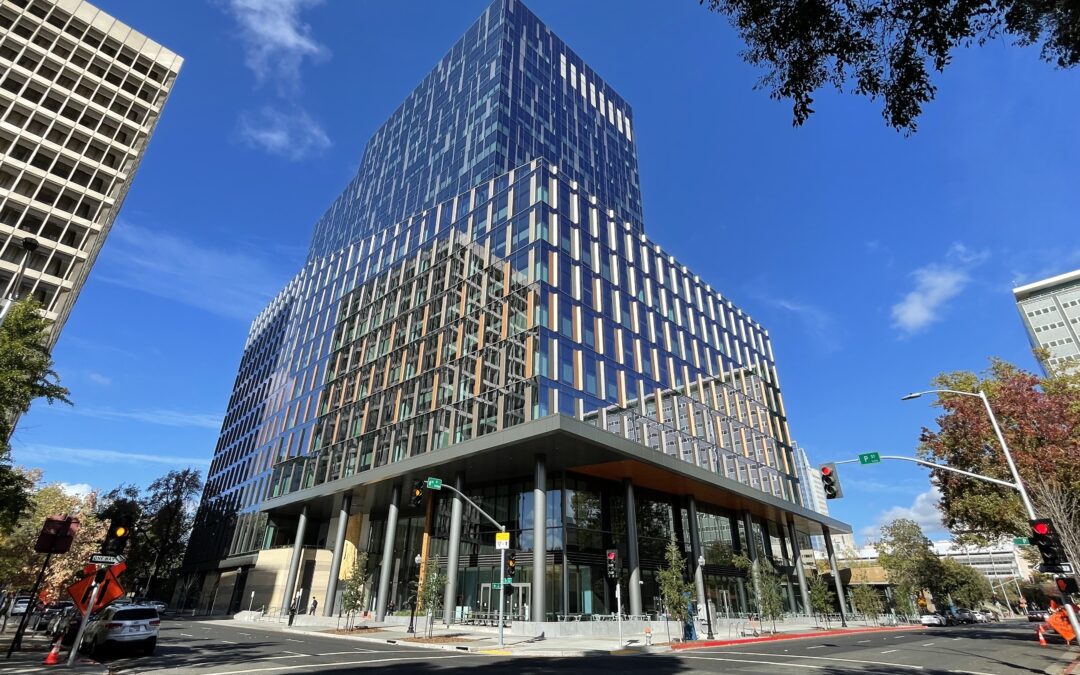Let’s talk about the Government.
I have friends with the State of California, who say that it looks like “Work From Home” (WFH) is here to stay. Just think, If the State reduces its office space by just 20%, that amounts to over 1,000,000 SF downtown alone – that works out to 4,000 state employees not eating lunch downtown. An example of collateral damage: Specialty’s, a great Lunch spot on Capitol Mall vacated 5,000 SF over two years ago and no takers have surfaced for the space. Specialty’s was killing it three years ago.
The State of California has completed over 1.2 million Square feet on O street. State agencies that once occupied buildings like Renaissance Tower at 801 K have moved here. So not only do you have a reduction in demand from the state to lease space, but the State is also moving into properties they own and develop – not privately held buildings.
Later this year the State will complete a 1.2 Million SF office project on Richards Boulevard, so more State Agencies will be moving out of privately held office buildings.
Won’t it be ironic if the State reverses its course and sends everyone back to the office?
I think the odds are pretty low that State workers will return to the office at pre-covid levels. But when the US House of Representatives voted on the “SHOW UP” act recently, you would think that this might spur contemplation at the Department of General Services. The premise of the Show Up Act contends that Federal employees are taking advantage of the system. Now that is a shocker! The Show Up Act calls to reinstate the practices that were in place in place prior to the pandemic. Don’t get me wrong, most of my State employee friends work harder than ever, but a minority of them have a lower golf handicap than they did before COVID.
When it comes to the Show Up act, I doubt that the proposed law will pass. Take a look at this article from CBS News: Federal Workers Back to the Office?
Future of Work Trends
Gartner, a leading research and advisory company, has identified 9 key trends that will shape the future of work in 2023 and beyond. The list is like many lists – it overstates the obvious. Items 3, 4, 7, and 8 are a little fresh; the rest would only be news to those just awakening from a coma.
1. Remote work will become the norm (obviously)
2. Employee experience will take center stage
3. Artificial intelligence will become pervasive (fast)
4. Digital ethics will be critical
5. The gig economy will continue to grow (obviously)
6. The role of HR will evolve (profound!)
7. The importance of upskilling and reskilling will increase (Sharpen the saw!)
8. The shift to value-based work will accelerate (Measurable?)
9. Wellness and work-life balance will be a priority (Old News)
Example from the Private Sector – Hybrid Working
In the post-COVID environment, a UK Based software development company conducted a case study on the implementation of hybrid working. The results showed that the switch to hybrid working was successful and enhanced employee productivity and job satisfaction. The organization also put in place policies and processes to 1. guarantee that remote workers stay in touch and engage with their coworkers and 2. that they have the tools needed to do a good job. The goal: Increased flexibility and productivity plue work-life balance for employees.
eRepublic, located in Folsom, just sold their 35,000 square-foot HQ. They were already implementing Hybrid work policies. Covid just accelerated the transition and now they only need about 2,000 SF. Bacon CRE teamed up with JLL to sell the property. Thank you Howard Hughes, Mike Stassi and Daniel Baker.
If you are a company trying to figure out the best way to go, Bacon CRE can help, both from the facility side and the commercial real estate side. If you are an office building owner with a current or looming vacancy, Bacon CRE can provide you with a practical and objective perspective. Bacon CRE can also get it leased! Call Tom Bacon, CCIM at (916) 761-1202.


Very informative article.I agree hybrid working is here to stay. As far as employees golf handicaps getting lower pre covid. that is also a benefit for the companies not having burned out workers. One of the biggest expenses for a company, such as State Employers is “Healthcare”. Allowing the “Hybrid working”, employees are allowed to be more active and consume new adventures which make them healthier. Mental Health is as important as Physical Health.
Chris – I totally agree with you. If a company allows hybrid work and the employees are happier, then they will be more loyal and productive. Just need to insure that the culture is there and everyone is engaged.